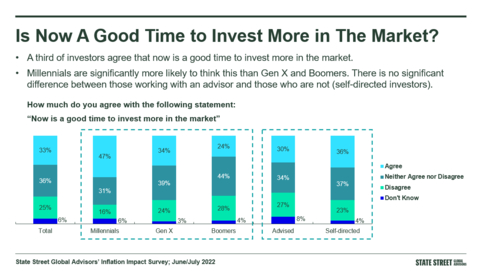State Street Global Advisors Survey: Investors Placing Greater Value on Their Financial Advisors’ Guidance Amid Uptick in Market Volatility; Nearly Half of Millennials Believe Now Is a Good Time to Invest in The Market
- Nearly nine-in-ten investors say their financial advisor has helped them remain confident in this period of rising inflation and market volatility
- Millennials are significantly more comfortable with the highs and lows of the financial markets than Generation X (Gen X) and Boomers
- Generation X is least likely to work with an advisor

A third of investors agree that now is a good time to invest more in the market. (
The release of this advisor-related data follows the initial findings of State Street Global Advisors’
“The top two questions advisors are hearing from their clients today are, ‘Is now a good time to invest?’ and ‘How can I protect my portfolio against inflation,’” said
The survey revealed that among those working with a financial advisor, about three-quarters have discussed inflation with their advisor, including how inflation will impact their investment goals in both the short and long-term. Furthermore, nine-in-ten say they value their financial advisors’ knowledge and guidance even more in these uncertain times, and
Is It Better to Work with a Financial Advisor? Sandwich Generation Unsure
Overall, approximately half of investors (
When examining the generational differences in attitudes about working with an advisor, Gen X respondents were the least likely to work with an advisor in today’s volatile markets. Only
Gen X’ers are the most concerned with rising inflation, with
“Advisors have an opportunity to cultivate trusting, collaborative relationships with Gen X clients who want to remain involved in making their own investment decisions to a greater extent than other generations,” said Bonds. “Gen X’ers are in their peak earning years and in the accumulation phase of their financial planning, yet they are also juggling multiple financial priorities. This generation is currently sandwiched between taking care of their children and aging parents. Gen X is more likely to have children under 18 in the household, so discretionary spending can become stretched if they are also supporting aging parents.”
Investor Tolerance for Market Volatility
A comparison of prior years’ comfort levels with market volatility shows that the market’s ups and downs are making investors more queasy. When asked how much they agree with the statement, ‘I am comfortable with the highs and lows of the financial markets,’ just
Millennials are the standout, with
“Millennials possess a glass half-full mentality when it comes to their financial futures. They know they have a longer time horizon to ride out the downturns and inflationary pressures. Sixty-three percent are optimistic they will reach their financial goals despite record inflation, whereas most investors in other generations believe inflation is an obstacle to meeting their objectives,” said Bonds.
Is Now a Good Time to Invest More in The Market?
There also seems to be some ambivalence about whether now is a good time to put more money to work in the market, with one-third (
Not surprisingly, Millennials (
“The old adage about investment success being about time in the market, not timing the market rings true today,” added Bonds. “Advisors who use a goals-based approach can help clients who are vulnerable to overreacting when markets take a downturn. This approach can help clients remain confident about their financial plan even in volatile markets.”
State Street Global Advisors’ Educational Content
For more on State Street Global Advisors’ point of view on how advisors can help clients remain confident during uncertain times, read Market Volatility: A Relationship-Building Opportunity for
Appreciating the True Value of Advice offers insights for individual investors on how to find the right financial advisor.
State Street Global Advisors’ list of 4 Things Investors Can Do in Volatile Markets provides insight for investors seeking ways to hedge their portfolio in today’s uncertain economic environment.
Market Volatility’s Back: Get In and Out With Liquid ETFs discusses the importance of liquidity in volatile markets.
For more on SPDR’s point of view on the market, economy and inflation read our 2022 Mid-Year Outlook and 5 Burning Questions Give Investors Insight: Durable Rebound or More Pain to Come?
SPDR’s Uncommon Sense provides contrarian perspectives from
For more on SPDR’s take on inflation and the
For more educational tools and resources on ETFs, click here.
To learn about how investors are using low-cost ETFs to achieve a variety of investment objectives, read Build a Low-Cost Core Portfolio with SPDR ETFs.
About State Street Global Advisors’
About SPDR Exchange Traded Funds
SPDR ETFs are a comprehensive family spanning an array of international and domestic asset classes. The funds provide investors with the flexibility to select investments that are aligned to their investment strategy. For more information, visit www.ssga.com.
About
For four decades,
*
†This figure is presented as
1
Important Risk Disclosures
The information provided does not constitute investment advice and it should not be relied on as such. It should not be considered a solicitation to buy or an offer to sell a security. It does not take into account any investor's particular investment objectives, strategies, tax status or investment horizon. You should consult your tax and financial advisor. The whole or any part of this work may not be reproduced, copied or transmitted or any of its contents disclosed to third parties without SSGA’s express written consent.
Investing involves risk, including the risk of loss of principal.
This communication is not intended to be an investment recommendation or investment advice and should not be relied upon as such.
ETFs trade like stocks, are subject to investment risk, fluctuate in market value and may trade at prices above or below the ETFs net asset value. Brokerage commissions and ETF expenses will reduce returns.
While the shares of ETFs are tradable on secondary markets, they may not readily trade in all market conditions and may trade at significant discounts in periods of market stress.
Equity securities may fluctuate in value and can decline significantly in response to the activities of individual companies and general market and economic conditions.
Frequent trading of ETFs could significantly increase commissions and other costs such that they may offset any savings from low fees or costs.
All information is from SSGA unless otherwise noted and has been obtained from sources believed to be reliable, but its accuracy is not guaranteed. There is no representation or warranty as to the current accuracy, reliability or completeness of, nor liability for, decisions based on such information and it should not be relied on as such.
There can be no assurance that a liquid market will be maintained for ETF shares.
The trademarks and service marks referenced herein are the property of their respective owners. Third party data providers make no warranties or representations of any kind relating to the accuracy, completeness or timeliness of the data and have no liability for damages of any kind relating to the use of such data.
Standard & Poor’s®, S&P® and SPDR® are registered trademarks of Standard & Poor’s
Distributor:
Before investing, consider the funds’ investment objectives, risks, charges and expenses. To obtain a prospectus or summary prospectus which contains this and other information, call 1-866-787-2257 or visit ssga.com. Read it carefully.
Not FDIC Insured · No Bank Guarantee · May Lose Value
© 2022
All Rights Reserved.
4864608.1.1.AM.RTL Exp. Date:
View source version on businesswire.com: https://www.businesswire.com/news/home/20220909005402/en/
+1 617 662 9927
DHEINDEL@StateStreet.com
Source:







